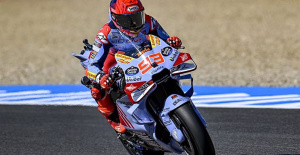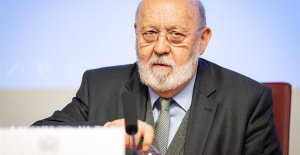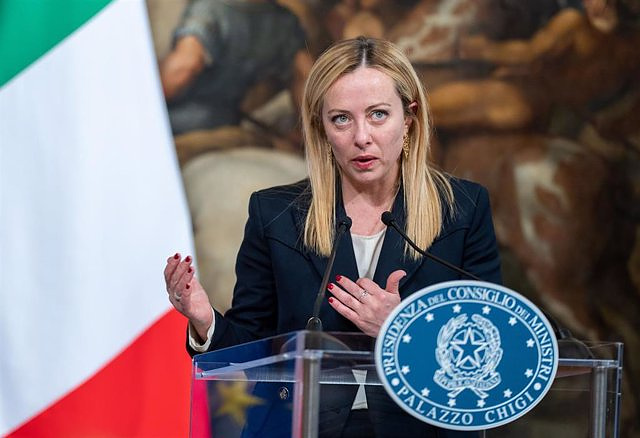Finland includes the extreme right in the new coalition, in Sweden there is external support and Germany and France maintain the sanitary cordon
MADRID, 18 Jun. (EUROPA PRESS) -
When a coalition government was formed in Austria in 2000 that included a far-right party, the EU, then made up of fifteen states, imposed sanctions on the country. Now, more than two decades later, the far-right parties have gained weight throughout the block and are even part of the Executive of one of the founding countries, Italy.
Joerg Haider's Freedom Party (FPO) led the way. 26.9% of the votes in the 1999 elections placed him as the second force and led the Popular Party (OVP) to form a coalition with this formation, whose first leader was a former member of the SS. The EU reacted by suspending bilateral contacts with the Austrian government, although the retaliation only lasted a few months.
In 2017 the OVP reissued the coalition with the FPO, now led by Heinz-Christian Strache, who ended up leaving the government and the party in 2019. This time, neither in Brussels nor in the rest of the community capitals did the presenta cause such a stir of the extreme right in the Austrian Executive.
The existence of far-right parties in post-World War II European politics is not new, but these types of formations were relegated to the margins. Since the year 2000, and especially as a result of the refugee crisis of 2015, its presence on the European political scene has become much more evident.
In France, Jean-Marie Le Pen's National Front was long the mirror in which many far-right parties looked. In 2002, Le Pen managed to advance to the second round of the presidential elections, but the unity of both the right and the left around the conservative Jacques Chirac prevented his victory.
His daughter Marine Le Pen took the reins of the party in 2011 and followed in her father's footsteps, even improving his data but with the same result, since in France the sanitary cordon of his party continues to prevail, renamed the National Grouping in 2018 in an attempt to leave his past behind.
Le Pen has managed to reach the second round in both the 2017 and 2022 presidential elections, losing in both cases to Emmanuel Macron after obtaining 33.9% and 41.46% respectively. In parliamentary elections, Agrupación Nacional doubled the votes, reaching 17.3%. Its greatest milestone was the first place harvested in the 2014 European elections, but at the regional level it did not get any government in the 2021 elections.
In Germany, another of the key countries in the European Union, the far-right cordon sanitaire has also prevailed to date. Here, the Alternative for Germany (AfD) has achieved representation in all regional parliaments in recent years, garnering second place in some regions, generally in the former GDR, but has not entered any government.
The far-right party entered the Bundestag for the first time with 12.6% of the votes in the 2017 elections, becoming the first opposition force because then the conservatives of the CDU of Angela Merkel and the social democrats of the SPD sealed a great coalition.
The formation was created in 2012 as an anti-European movement, but it has evolved in its discourse, adopting positions clearly against immigration that were encouraged by the arrival of more than a million refugees in the country in 2015.
A recent poll has placed the AfD as the second force, with 18% and ahead of Chancellor Olaf Scholz's SPD. After that, the leader of the CDU, Friedrich Merz, assured that as long as he continues to lead the conservative party he will not agree with the AfD, which he called "xenophobic and anti-Semitic."
Meanwhile, Italy has had its first head of government from a far-right party since last October, Giorgia Meloni, leader of the Brothers of Italy (FDI). This formation, co-founded by Meloni in 2014, has its origins in the Italian Social Movement (MSI), heir to fascism, which was later succeeded by the National Alliance (AN).
In reality, Meloni has done nothing but reissue the bloc that Silvio Berlusconi set up in his day and that led him to the Government in 1994. The leader of Forza Italia joined forces with Alianza Nacional and Liga Norte, an ultra-right party that originally defended the interests of the northern part of the country.
The three parties repeated the formula in 2001 and 2008, always with Berlusconi at the helm. After the resignation of the leader of Forza Italia in 2011, the balance of power was reconfigured.
The Northern League, already with Matteo Salvini at the helm, became just the League, becoming the third force with the most votes in the 2018 elections and ahead of the rest of the members of the block. The party then agreed with the 5 Star Movement (M5S) for a government coalition headed by the lawyer Giuseppe Conte.
Both the League and Forza Italia supported the new government of the technocrat Mario Draghi in 2021, while the Brothers of Italy chose to remain on the sidelines, a decision that earned the party victory in first place in the elections last September and made Meloni the the first woman to lead a government in Italy.
The extreme right had already ruled for a long time in two eastern countries: Hungary and Poland. In both cases, the drifts undertaken by their respective governments have even led Brussels to adopt retaliatory measures.
In Hungary, Viktor Orban's Fidesz has ruled since 2010 and has managed to establish itself as the great protector of European culture, Christianity and the traditional family. Over the years, Orban has shaped the system at will, with the approval of a new Constitution, to the point that the European Parliament has described Hungary as an "electoral autocracy."
In the case of Poland, Law and Justice (PiS) has also undergone a similar trajectory evolving from the center to the extreme right. After a first stage in power between 2005 and 2007 in a coalition with two even more radical parties, PiS returned to government in 2015 and since then some of its measures, such as those relating to the independence of judges, have put them in conflict frontal with Brussels.
In Latvia, Prime Minister Krisjanis Karins' coalition counts among its five members the far-right National Alliance party, which has been in every government since 2011.
The last case of success of a far-right party has been in Finland. Here, the Party of the Finns was the second force with the most votes on April 2 and has joined the coalition headed by the conservative National Coalition of Petteri Orpo and which also includes the Christian Democratic Party of Finland (PCDF ) and the Finnish People's Party (PPF).
For their part, the Sweden Democrats, who have been experiencing increasing support to become the second most voted in last September, have become key to governability in the country with their external support for the right-wing minority government led by Ulf Kristersson.
There are also far-right parties present in the parliaments of other European countries. In Portugal, which, like Spain, had remained oblivious to this trend, Chega, a party created in 2019, became the third force in the 2022 elections, while in Greece, Greek Solution has won parliamentary representation in the recent elections, taking thus the witness to the extinct Golden Dawn that in the 2014 Europeans was the third force.

 Exploring Cardano: Inner Workings and Advantages of this Cryptocurrency
Exploring Cardano: Inner Workings and Advantages of this Cryptocurrency Seville.- Economy.- Innova.- STSA inaugurates its new painting and sealing hangar in San Pablo, for 18 million
Seville.- Economy.- Innova.- STSA inaugurates its new painting and sealing hangar in San Pablo, for 18 million Innova.- More than 300 volunteers join the Andalucía Compromiso Digital network in one month to facilitate access to ICT
Innova.- More than 300 volunteers join the Andalucía Compromiso Digital network in one month to facilitate access to ICT Innova.-AMP.- Ayesa acquires 51% of Sadiel, which will create new technological engineering products and expand markets
Innova.-AMP.- Ayesa acquires 51% of Sadiel, which will create new technological engineering products and expand markets Marc Márquez returns to pole in Jerez
Marc Márquez returns to pole in Jerez The CIS carries out a quick survey on Sánchez's letter to measure the reaction of citizens
The CIS carries out a quick survey on Sánchez's letter to measure the reaction of citizens 12M.- Puigdemont to Sánchez and Illa: "This is not about the future of the PSOE! What have you believed?"
12M.- Puigdemont to Sánchez and Illa: "This is not about the future of the PSOE! What have you believed?" Díaz proclaims that "the Government is not going to bow down" and asks not to be "on the defensive and locked in" against the right
Díaz proclaims that "the Government is not going to bow down" and asks not to be "on the defensive and locked in" against the right How Blockchain in being used to shape the future
How Blockchain in being used to shape the future Not just BTC and ETH: Here Are Some More Interesting Coins Worth Focusing on
Not just BTC and ETH: Here Are Some More Interesting Coins Worth Focusing on UPV students build a prototype of a wooden house to move to Equatorial Guinea
UPV students build a prototype of a wooden house to move to Equatorial Guinea The UA opens the call for the Impulso 2024 Awards for the best innovative business initiatives
The UA opens the call for the Impulso 2024 Awards for the best innovative business initiatives ALI, virtual assistant from Alicante, internationally recognized by the OECD
ALI, virtual assistant from Alicante, internationally recognized by the OECD Retrópolis brings the golden age of video games and computing to the UPV
Retrópolis brings the golden age of video games and computing to the UPV A million people demonstrate in France against Macron's pension reform
A million people demonstrate in France against Macron's pension reform Russia launches several missiles against "critical infrastructure" in the city of Zaporizhia
Russia launches several missiles against "critical infrastructure" in the city of Zaporizhia A "procession" remembers the dead of the Calabria shipwreck as bodies continue to wash up on the shore
A "procession" remembers the dead of the Calabria shipwreck as bodies continue to wash up on the shore Prison sentences handed down for three prominent Hong Kong pro-democracy activists
Prison sentences handed down for three prominent Hong Kong pro-democracy activists ETH continues to leave trading platforms, Ethereum balance on exchanges lowest in 3 years
ETH continues to leave trading platforms, Ethereum balance on exchanges lowest in 3 years Investors invest $450 million in Consensys, Ethereum incubator now valued at $7 billion
Investors invest $450 million in Consensys, Ethereum incubator now valued at $7 billion Alchemy Integrates Ethereum L2 Product Starknet to Enhance Web3 Scalability at a Price 100x Lower Than L1 Fees
Alchemy Integrates Ethereum L2 Product Starknet to Enhance Web3 Scalability at a Price 100x Lower Than L1 Fees Mining Report: Bitcoin's Electricity Consumption Declines by 25% in Q1 2022
Mining Report: Bitcoin's Electricity Consumption Declines by 25% in Q1 2022 Oil-to-Bitcoin Mining Firm Crusoe Energy Systems Raised $505 Million
Oil-to-Bitcoin Mining Firm Crusoe Energy Systems Raised $505 Million Microbt reveals the latest Bitcoin mining rigs -- Machines produce up to 126 TH/s with custom 5nm chip design
Microbt reveals the latest Bitcoin mining rigs -- Machines produce up to 126 TH/s with custom 5nm chip design Bitcoin's Mining Difficulty Hits a Lifetime High, With More Than 90% of BTC Supply Issued
Bitcoin's Mining Difficulty Hits a Lifetime High, With More Than 90% of BTC Supply Issued The Biggest Movers are Near, EOS, and RUNE during Friday's Selloff
The Biggest Movers are Near, EOS, and RUNE during Friday's Selloff Global Markets Spooked by a Hawkish Fed and Covid, Stocks and Crypto Gain After Musk Buys Twitter
Global Markets Spooked by a Hawkish Fed and Covid, Stocks and Crypto Gain After Musk Buys Twitter Bitso to offset carbon emissions from the Trading Platform's ERC20, ETH, and BTC Transactions
Bitso to offset carbon emissions from the Trading Platform's ERC20, ETH, and BTC Transactions Draftkings Announces 2022 College Hoops NFT Selection for March Madness
Draftkings Announces 2022 College Hoops NFT Selection for March Madness























